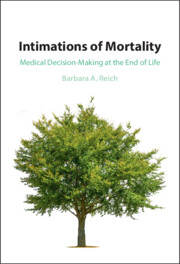Book contents
- Intimations of Mortality
- Intimations of Mortality
- Copyright page
- Dedication
- Contents
- Preface
- Acknowledgments
- 1 The Conundrum
- 2 The US Health Care ‘System’
- 3 Autonomy and Informed Consent in the Real World
- 4 The Denial of Death and Its Sequelae
- 5 Disorders of Consciousness and the Meaning of Life
- 6 More Barriers to Good Communication
- 7 Palliative and Hospice Care
- 8 Rational Apathy and the Role of Uncertainty
- 9 The Crucible
- 10 Resolving Conflicts at the End of Life
- 11 At the End of the Day
- 12 Coda
- Index
6 - More Barriers to Good Communication
Published online by Cambridge University Press: 10 March 2022
- Intimations of Mortality
- Intimations of Mortality
- Copyright page
- Dedication
- Contents
- Preface
- Acknowledgments
- 1 The Conundrum
- 2 The US Health Care ‘System’
- 3 Autonomy and Informed Consent in the Real World
- 4 The Denial of Death and Its Sequelae
- 5 Disorders of Consciousness and the Meaning of Life
- 6 More Barriers to Good Communication
- 7 Palliative and Hospice Care
- 8 Rational Apathy and the Role of Uncertainty
- 9 The Crucible
- 10 Resolving Conflicts at the End of Life
- 11 At the End of the Day
- 12 Coda
- Index
Summary
Health care policy experts in the United States have been studying for years how to improve the experience of dying and how to avoid overutilization of inappropriate and unwanted medical interventions at the end of life, but progress toward these goals is slow. In fact, the problems described in preceding chapters appear to be getting worse in some respects. As Chapter 3 explained, the law of informed consent is relevant to these problems but doesn’t do much to solve them. Informed consent law and the underlying ethical principles of autonomy and beneficence impose a duty to inform patients of the risks and benefits of treatment such as late-stage chemotherapy and life-sustaining care (including the risk of harms and the likelihood of success measured by cure, extended life expectancy, or palliation of symptoms). But the mechanical process of legal consent rarely helps improve patient understanding of the complexity and magnitude of the decisions she faces.
Keywords
- Type
- Chapter
- Information
- Intimations of MortalityMedical Decision-Making at the End of Life, pp. 107 - 130Publisher: Cambridge University PressPrint publication year: 2022



